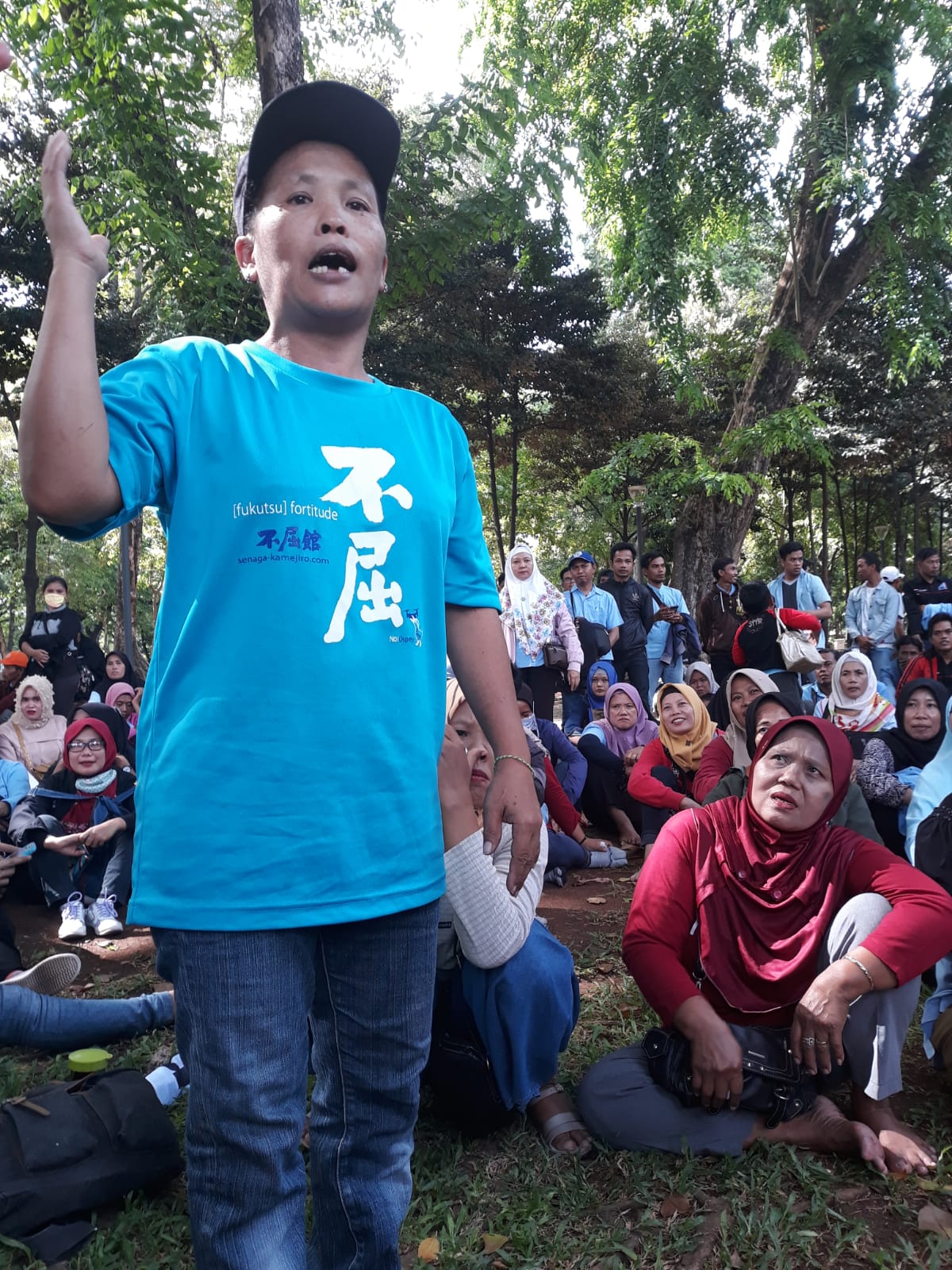
Indonesian workers file FLA complaint against Uniqlo and S.Oliver
After years in which Uniqlo refused to engage in a serious mediation process, Clean Clothes Campaign (CCC) together with the workers of the Indonesian Jaba Garmindo factory group filed a complaint with the Fair Labor Association (FLA). The complaint is directed against Fast Retailing, parent company of the Uniqlo brand, and German brand s. Oliver for violating FLA’s Workplace Code of Conduct and its “Principles of Fair Labor and Responsible sourcing”, designed to ensure the “respectful and ethical treatment of workers” and to “promote sustainable conditions” in the garment industry.
In April 2015, two Indonesian clothing factories in Cikupa and Majalengka closed down over night without paying legally required severance payments and several months of wages to its mostly women workforce. The factory closures followed the sudden bankruptcy of the company after its major buyers, most notably Uniqlo withdrew their business from the factory. The thousands of workers employed by Jaba Garmindo were given no warning that their factory was in trouble. They only learned of the factory closure and bankruptcy through media reports.
Factory documents obtained by workers proves that Uniqlo and s. Oliver were the most significant buyers at the factory in the years prior to the closure, collectively retaining well over 50% of the factory production volume in 2014. Workers have testified the influence Uniqlo had over the factory production and working conditions with workers reporting the arrival of brand led to sky rocketing targets, forced overtime, and work pressure. Court documents from the bankruptcy proceedings cite the business practices of buyers as a significant contributing factor in the factories’ closure.
Nurhayat, Vice Chairman of Labour Union FSPMI formerly at PT Jaba Garmindo says: “It is plainly unjust that workers who made Uniqlo clothes suffer needlessly, while the Uniqlo brand continues to grow and thrive, generating billions in profits. We earned the right to the money we are owed over years of working hard to make Uniqlo clothes. To refuse to pay us is tantamount to wage theft and that should be sufficient cause for the FLA take immediate action.”
As FLA affiliated brands, Uniqlo and s. Oliver are required to adhere to the FLA’s Workplace Code of Conduct, which clearly state that companies must ensure their suppliers safeguard workers’ rights under national and international labour and social security laws. This includes the provision that workers receive all legally mandated compensation. Since the factory closures, 2000 Jaba Garmindo workers have demanded Uniqlo and s. Oliver accept their responsibility and collectively pay the workers $5.5 million owed in outstanding severance payments. Because legal processes have now been exhausted, workers turn to the FLA as one of the last available mechanisms for remedy.
Many women worked at the factories for long periods of time, and are now considered middle aged with little perspective of finding other employment in an industry that prefers to hire young women. Nearly 600 workers live in destitute conditions, forced to accept jobs which pay well below the minimum wage.
Mirjam van Heugten from Clean Clothes Campaign says: “Uniqlo keeps saying it has no legal obligation to pay what is owed to the the Jaba Garmindo workers, and that is exactly the problem – there is a legal accountability vacuum in the garment industry. The codes of conduct that many brands refer to when it comes to labour rights issues are voluntary and workers far too often have to rely on a brand’s goodwill to uphold their responsibility as outlined in international norms and standards. We expect the FLA to give real meaning to the promises made to workers in its code of conduct and ensure full remedy for the Jaba Garmindo workers.”
Many of Uniqlo’s closest competitors, some also FLA members, have agreed to contribute to the payment of severance claims in cases where a supplier went bankrupt. For example, Nike, adidas, Disney, Fruit of the Loom, Hanesbrands, H&M, and Walmart either directly provided the funds owed to workers or pressed their supply chain partners to do so.
Over the past several years, the #PayUpUniqlo campaign has received significant global public support, which led to two initial mediation meetings in July 2017 and November 2018 that workers thought indicated the start of a serious mediation process. However, Uniqlo has since refused to participate in further meetings, despite calls by the FLA for Fast Retailing to seek a suitable resolution for the factory workers,” issued earlier this year.
Artemisa Ljarja, Urgent Appeal Coordinator from Clean Clothes Campaign Germany says: “What is being asked of these brands is not exceptional. What is unusual is the full out refusal of these brands to act in line with this emerging industry standard and step up and pay what is owed to these workers. Uniqlo should not be able to buy credibility through recent partnerships with the ILO and UN women while simultaneously ignoring the voice of thousands of women workers whose labour made them one of the most profitable brands in the world. Now it is up to the FLA to ensure these brands are held accountable for the promises they made to respect garment workers’ rights in their supply chain.”